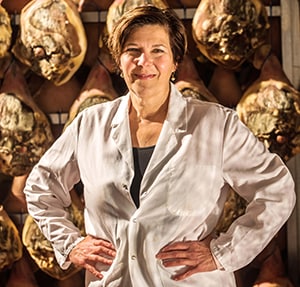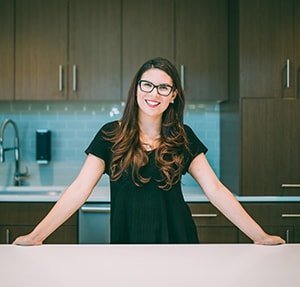The awards are given in three categories:
- Business Leadership: Advancing best practices across the spectrum of workforce issues to benefit food industry personnel.
- Citizenship: Improving the lives of people and communities by advancing environmental and social sustainability knowledge and practice.
- Vision: Pioneering new approaches, innovative products, and business models to set in motion positive change and progress.
Business Leadership

Lorenza Pasetti, Volpi Foods.Volpi Foods was opened in St. Louis, MO, in 1902 by Giovanni Volpi, an Italian immigrant. Pasetti became President in 2002 after her father, Armando Pasetti, stepped down.
Pasetti got her MBA at Washington University, and joined the company in the mid-1980s. When she joined, there were 12 employees and 8 SKUs; today, there are 210 employees and 150 SKUs, and the original shop is still in operation.
Pasetti sources free-roaming, heritage breeds from local, sustainable farms. Her father works some days; all three of her children work in the business.
“It’s part of my DNA,” Pasetti said in the press release. “Some things you don’t do for money; it’s just the right thing to do.” And it worked out for her: “Now dry-cured meats and charcuterie are really in vogue. After 117 years, we’re an overnight success.”
Citizenship

Elizabeth Stein, Purely Elizabeth.In 2008, Stein made a batch of gluten-free blueberry muffins to hand out at a booth at a Westchester, NY race expo. At the time, she had just begun a practice as a wellness counselor; part of her advice included urging her clients to go gluten-free for 30 days to see if they felt better. After she handed out the muffins, people “went wild” for them, and asked where the muffins could be purchased. “I told them to sign up for my nutrition newsletter and I’d let them know when they were available,” she said in the release.
Stein set up a business, and in 2009 she launched Purely Elizabeth Blueberry Muffin Mix, Apple Cinnamon Muffin Mix, Cacao Muffin Mix, and Perfect Pancake Mix. Within two weeks she had 10,000 orders.
Stein’s business is a Certified B Corporation, and uses non-GMO, organic ingredients. It “seeks to promote a healthy food system through sustainability and transparency and to be a force for good.” It donates to nonprofits such as Slow Food USA, Wellness in the Schools, Charity: Water, and the Fruit Tree Planting Organization.
Vision

Natalie Shmulik, The Hatchery, Chicago.The Hatchery is a nonprofit food and beverage incubator, headquartered in an underserved neighborhood on the west side of Chicago. Shmulik was hired as a consultant in 2015 and became CEO in 2018. Her philosophy: “First and foremost, I wanted to create a feeling of safety for the entrepreneurs. It’s an uphill battle trying to figure it all out on your own; the margins, dealing with perishable products. We wanted to give them what they needed to be as successful as possible, a way to share strategies and knowledge and be with like-minded individuals. It can be so isolating and mentally draining and exhausting, and you question if you have the strength to continue.”
Part of the problem, Shmulik says, is that “you actually have to be a jack of all trades to master one.” Before she worked at The Hatchery, she studied English and theatre, received a Master of Liberal Arts degree in Gastronomy, owned and ran a breakfast and lunch franchise in Toronto, and worked in the demo program and culinary school at supermarket chain Longo’s. “All of my experience in the food industry, in retailing, marketing, designing, writing, and consumer packaged goods led me to this incubation job.”
At the new $34 million, 67,000-square-foot facility, she teaches classes on starting a food business. So far, 150 local jobs have been created.











